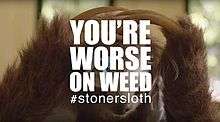Stoner Sloth
"Stoner Sloth" was an anti-cannabis public service announcement series of three videos, created by Australia's New South Wales Department of Premier and Cabinet in 2015.[1][2]
 | |
| Agency | Saatchi & Saatchi |
|---|---|
| Client | New South Wales Department of Premier and Cabinet |
| Language | English |
| Media | Television |
| Release date(s) | 2015 |
| Country | Australia |
| Budget | $500,000 |
Content
Each ad begins with a scenario involving people in public places. As everyone is acting "normal", it is all disrupted by Stoner Sloth, a sloth who reacts slowly while moaning. Stoner Sloth is meant to represent the behavior of a stereotypical stoner and its actions are accompanied by a musical cue of a guitar being weakly strummed. The human characters around Stoner Sloth usually react with disgust or disappointment.
Reception
The creative firm Saatchi & Saatchi created the ads which "backfired miserably" and were an "instant and classic fail",[1] according to trade publication Adweek.[3] The agency defended its ads, which cost $500,000.[4] The National Cannabis Prevention and Information Centre distanced itself from the campaign.[5]
See also
References
- Nudd, Tim (December 20, 2015). "Australia's 'Stoner Sloth' Anti-Marijuana Campaign Is an Instant and Classic Fail". AdWeek. Retrieved April 26, 2017.
- Hanson, Hilary (December 18, 2015). "'Stoner Sloth' Campaign Is Peak Anti-Marijuana Absurdity". The Huffington Post. Retrieved April 26, 2017.
- Erik Oster (December 21, 2015), "Saatchi & Saatchi's 'Stoner Sloth' Effort for New South Wales Backfired Miserably", Adweek
- Duff, Eamonn (December 27, 2015). "Saatchi & Saatchi defends $500,000 'Stoner Sloth' anti-marijuana campaign". The Sydney Morning Herald. Retrieved 26 April 2017.
- Wahlquist, Calla (December 19, 2015). "'Stoner sloth' anti-drug campaign gets reality check as medical experts walk away". The Guardian. Retrieved April 26, 2017.